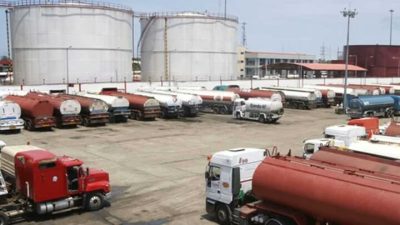
The Petroleum Products Retail Outlets Owners Association of Nigeria (PETROAN) says the Dangote Refinery’s forward integration adoption could lead to a monopoly in disguise.
On June 15, Dangote refinery said it would begin the nationwide distribution of diesel and premium motor spirit (PMS), also known as petrol, on August 15.
In a statement on Monday, signed by Joseph Obele, PETROAN’s national public relations officer, the association said the development could also pose a significant job loss threat to Nigeria.
“The Petroleum Products Retail Outlets Owners Association of Nigeria (PETROAN) has raised concerns about Dangote Refinery’s forward integration adoption, warning that it could lead to a monopoly in disguise and pose a significant job loss threat to Nigeria,” the statement reads.
“With a production capacity of 650,000 barrels per day, PETROAN argues that Dangote Refinery should be competing with global refineries, not operating as a distributor in the downstream sector.
“This massive refinery, one of the largest in sub-Saharan Africa, is expected to satisfy domestic fuel demand and export surplus products.”
According to the statement, PETROAN had earlier said it raised alarms about Dangote’s plans to dominate the downstream sector, citing concerns that the company may use its market power to fix prices, limit competition, and exploit consumers, “much like it has in other sectors.”
PETROAN warned that Dangote’s tactics “may include a pricing penetration strategy, where they reduce prices to capture market share, with the ultimate goal of forcing other filling station operators to quit the market.”
“This could lead to a massive shutdown of filling stations across Nigeria, resulting in widespread job losses,” the statement reads.
‘INTRODUCTION OF 4,000 TRUCKS POSES THREAT TO TRUCK DRIVERS, OWNERS’
The association further warned that the introduction of 4,000 new compressed natural gas (CNG)-powered tankers by Dangote refinery “poses a significant threat to the livelihoods of thousands of truck drivers and owners.”
“While CNG trucks may offer a lower cost of transporting petroleum products, this shift could lead to widespread job losses in the industry,” PETROAN said.
The adoption of the strategy by Dangote refinery, the association said, will significantly affect various stakeholders, including modular refineries, as their operations and market share may be threatened by Dangote’s dominance.
“Filling Station Operators: Many may be forced to shut down due to Dangote’s pricing penetration strategy and dominance,” the statement reads.
“Local Suppliers of Petroleum Products: Their businesses may be negatively impacted by Dangote’s direct supply to end-users.
“Telecom Diesel Suppliers: Their operations and market share may be threatened by Dangote’s dominance.
“It is obvious that Dangote plans to gain full monopoly of the downstream sector, which would enable the company to exploit Nigeria’s petroleum consumers.”
According to the association, this could lead to higher prices, reduced competition, and decreased economic efficiency.
Speaking on the development, Billy Gillis-Harry, national president of PETROAN, said the executive director of the Nigerian Midstream and Downstream Petroleum Regulatory Authority (NMDPRA) and the minister of state for petroleum “should put in place price control mechanisms to prevent any form of monopoly.”
Gillis-Harry said competition should always be encouraged to protect consumers and promote economic efficiency.
‘PETROAN’S RECOMMENDATIONS’
The association asked the federal government and regulators to encourage a competitive refining market environment.
“Regulatory Oversight: Strengthen regulatory agencies to monitor market behavior,” the association said.
“Support Local Refineries: Ensure crude oil supply to local refineries.”
PETROAN also urged the government to mitigate job losses by exploring alternative livelihoods for affected workers. (The cable)

